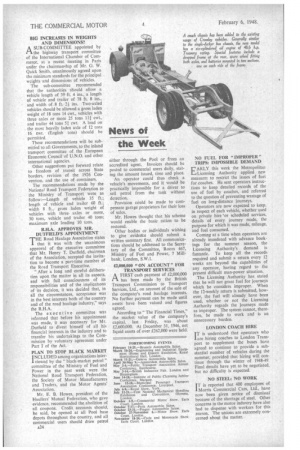News of the Week
Page 26

If you've noticed an error in this article please click here to report it so we can fix it.
BIG INCREASES IN WEIGHTS AND DIMENSIONS?
ASUB-COMMITTEE appointed by the highway transport committee of the International Chamber of Commerce, at a recent meeting in Paris under the chairmanship of Mr. G. W. Quick Smith, unanimously agreed upon the minimum standards for the principal weights and dimensions of vehicles.
The sub-committee recommended that the authorities should allow a vehicle length of 39 ft. 4 ins., a length of vehicle and trailer of 78 ft. 8 ins., and width of 8 ft. 2+ ins. Two-axled vehicles should be allowed a gross laden weight of 18 tons 14 cwt., vehicles with three axles or more 25 tons 111 cwt., and ttailer 44 tons 51 cwt. A load on the most heavily laden axle of 12 tons 16 cwt. (English tons) should be permitted.
These recommendations will be submitted to all Governments, to the inland transport committee of the European Economic Council of U.N.O. and other international agencies.
Other suggestions put forward relate to freedom of transit across State borders, revision of the 1926 Convention, and the use of containers.
The recommendations made by the National Road Transport Federation to the Ministry of Transport were as follow:—Length of vehicle 35 ft.; length of vehicle and trailer 60 ft.; width 8 ft., gross laden weight of vehicles with threeaxles or more, 30 tons, vehicle and trailer 40 tons; maximum axle loading 10 tons.
R.H.A. APPROVES MR.
DUTFIELD'S APPOINTMENT THE Road Haulage Association states that it was with the unanimous approval of the executive committee that Mr. Henry T. Duffield, chairman of the Association, accepted the invitation to become a part-time member of the Road Transport Executive.
"After a long and careful deliberation upon the matter in all its aspects, and with full consciousness of its responsibilities and of the implications of its decision, it was decided that, in all the circumstances, acceptance was in the best interests both of the country and of the road haulage industry," says the R.H.A.
The executive committee was informed that before his appointment was made, it was necessary for Mr. Dutfield to divest himself of all his financial interests in the industry and to transfer his undertakings to the Commission by voluntary agreement under Part I of the Act.
PLAN TO STOP BLACK MARKET
'NCLUDED among organizations interviewed by the "black-market petrol" committee of the Ministry of Fuel and Power in the past week were the tslational Road Transport Federation, the Society of Motor Manufacturers and Traders, and the Motor Agents' Association.
Mr. E. B. Howes, president of the Hauliers' Mutual Federation, who gave evidence, recommended the abolition of all coupons. Credit accounts should, be said, be opened at all Pool base depots throughout the country, and all commercial users should draw petrol A24 either through the Pool or from an accredited agent. Invoices should be posted to commercial users daily, stating the amount issued, time and place.
An operator could thus check a vehicle's movements, and it would be practically impossible for a driver to sell petrol from the tank without detection.
Provision could be made to compensate garage proprietors for their loss of sales.
Mr. Howes thought that his scheme would enable the basic ration to be restored.
Other bodies or individuals wishing to give eviderfce should submit a written summary first. All communications should be addressed to the Secretary of the Committee, Room 467, Ministry of Fuel and Power, 7 Millbank, London, SW.!.
£2,000,000 "ON ACCOUNT" FOR TRANSPORT SERVICES
AFIRST cash payment of £2,000,000 has been made by the British Transport Commission to Transport Services, Ltd., on account of the sale of the company's road haulage interests. No further payment can be made until assets have been valued and figures agreed.
According to "The Financial Times," the market value of the company's capital, last Friday, was about £2,600,000. At December 31, 1946, net liquid assets of over £262,000 were held. NO FUEL FOR "IMPROPER" TRIPS: IMPOSSIBLE DEMAND
EARLY this week the Metropolitan Licensing Authority applied new measurec to restrict the issues of fuel for coaches. He sent operators instructions to keep detailed records of the use of fuel by coaches, and referred to the question of preventing wastage of fuel on long-distance journeys.
Operators are now expected to keep. in respect of each vehicle, whether used on private hire 'or scheduled services, details of every journey made, the purpose for which it was made, mileage, and fuel consumed.
Coming at a time when operators are already inundated with advance bookings for the summer season, the Licensing Authority's demand is fantastic. To keep all the records required and submit a return every 12 weeks are beyond the capabilities of any operator, having regard to the present difficult man-power situation.
The Licensing Authority has stated that he will not grant fuel for journeys which he considers improper. When the 12-weekly return is submitted, however, the fuel will already have been used, whether or not the Licensing Authority regards the journeys made as improper. The system cannot, therefore, be made to work and is an unnecessary burden.
LONDON COACH HIRE
I T is understood that operators who
are hiring coaches to London Transport to supplement the buses have agreed to continue to provide a substantial number of vehicles during the summer, provided that hiring will continue through the winter of 1948-49. Final details have yet to be negotiated, but no difficulty is expected.
NO STEEL: NO WORK
IT is reported that 400 employees of I Morris Commercial Cars, Ltd., have now been given notice of dismissal because of the shortage of steel. Other concerns in the motor industry have also had to dispense with workers for this reason. The unions are extremely concerned about the matter.
















































































